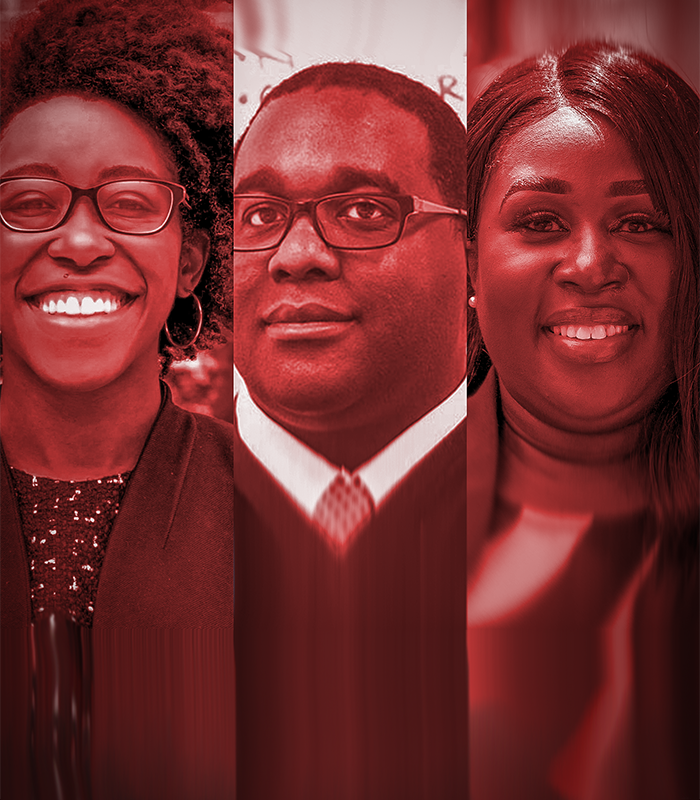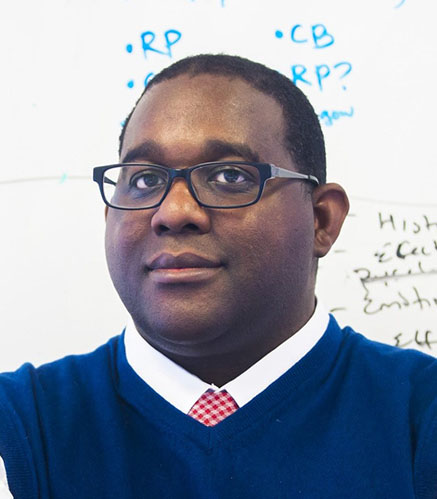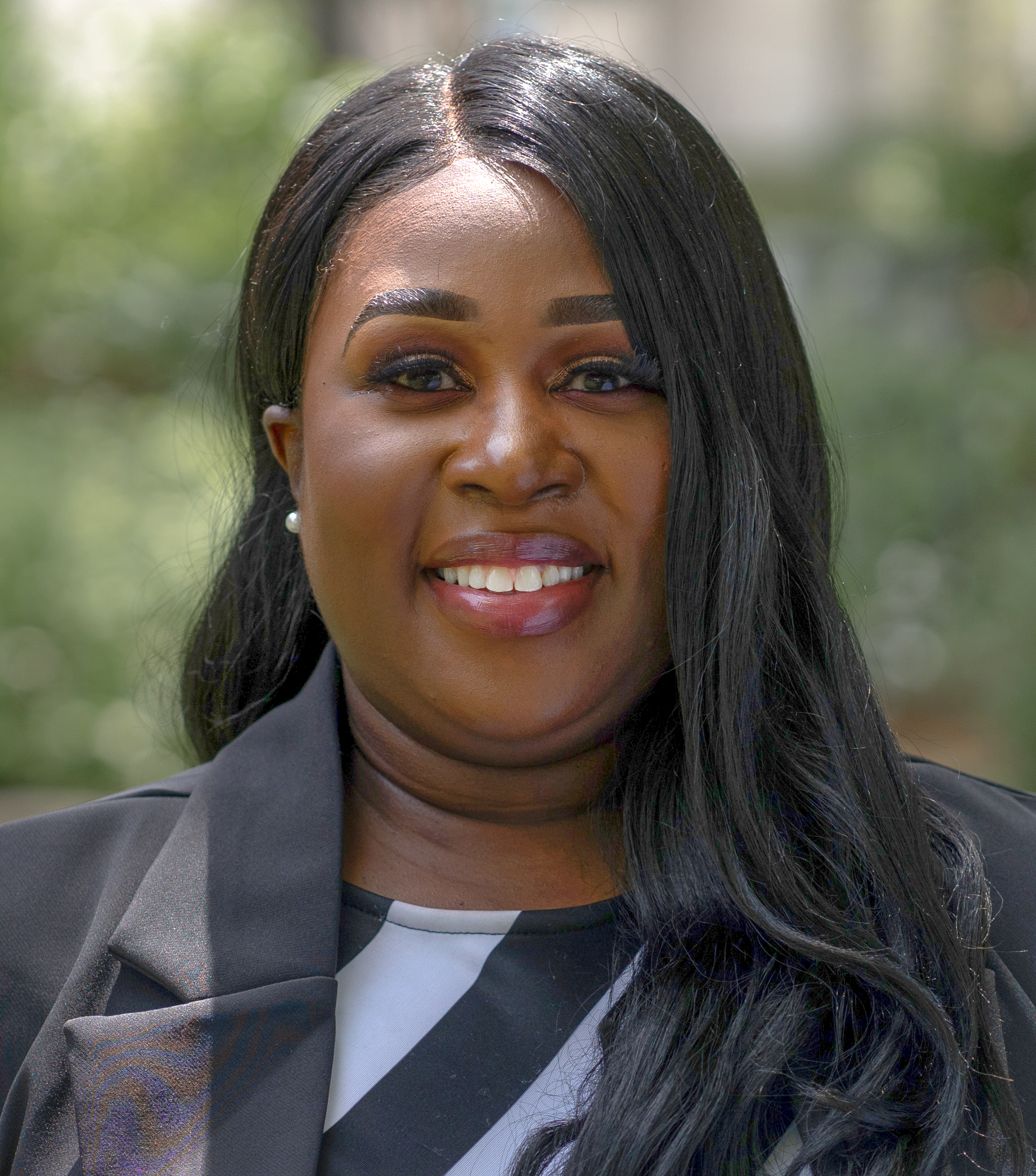Advice for scholars


Advice for scholars
who “look like me”
Three successful scholars of color
provide insight for success in research and funding
Being a successful scholar—from developing a line of research to obtaining funding—is challenging for most people, but for scholars of color, the barriers can be even more imposing especially at the highest levels of funding from the National Institutes of Health and the like.
It’s a common feeling, it appears, but one that is not insurmountable as these three successful recipients of NIH funding attest. Here is some advice from them to other emerging scholars of color to succeed in research and funding.

Advice for scholars
who “look like me”
Three successful scholars of color provide insight for success in research and funding
Being a successful scholar—from developing a line of research to obtaining funding—is challenging for most people, but for scholars of color, the barriers can be even more imposing especially at the highest levels of funding from the National Institutes of Health and the like.
It’s a common feeling, it appears, but one that is not insurmountable as these three successful recipients of NIH funding attest. Here is some advice from them to other emerging scholars of color to succeed in research and funding.
The three scholars offering their insight

Associate Professor
Department of Psychology
Georgia State University
Executive Director of the
Health Equity, Agency, Racism and
Trauma (HEART) Lab

Associate Professor
Department of Psychology
Emory University
Director of
The Behavioral Genetics of Addiction Laboratory

Professor
School of Social Work,
UNC at Chapel Hill
Executive Director and
Founding Director of
the INSPIRED Lab
Don’t go it alone

I didn’t think I was necessarily a good fit for specific types of funding, particularly NIH, because I didn’t see many people that look like me getting and receiving funding,” says Sierra Carter.
Scholars early in their research careers need guidance and encouragement. This might be especially true for scholars of color because of the lack of representation in most fields.
Through a training opportunity at the National Institute of Drug Abuse (NIDA), Trenette Goings had opportunities to meet other scholars like her. “No one in my personal circle held a doctorate degree or had experience writing grant proposals,” she explains. “And so for me, it was really exciting to see people who look like me, who were successful in getting NIH grants. I think seeing their success confirmed for me that I could be a successful researcher.”
She went on to find mentors who helped her navigate not only the scholarship but the world of funding as well. When those potential mentors do not make themselves known, Goings says to go after them. “I think it’s important that we not just sit back and allow things to happen, but that we proactively make things happen,” she says. That includes reaching out to other scholars and even project officers.
Trenette Goings says be bold in reaching out
Sierra Carter says that for some, it might be a challenge to find relevant support and mentorship, but it is imperative. She says that “you might have to seek them out” rather than expecting them to be front and center in the places you look especially for scholars who are in niche fields of study like her field of racism scholarship.
Carter was once presenting at a poster session and a woman came up to see her poster. She realized it was a scholar whose work she read all the time. “I was really giddy, and I was just talking about all the articles I read, like a nerd,” she explained. Ten years later, she reached out to her when working at the same university. She replied, “Oh, is this the same Sierra Carter who is giddy about my work? How could I forget to you?!”
Based on this experience, Carter says, do not be shy about reaching out to those who might help.
Sierra Carter says you have to be the one to reach out
For Carter, the appreciation for the mentorship she has received has blossomed into a commitment to provide it herself. “Now I’m a mentor for the program,” she says about one of her fellowships.
Rohan Palmer also did not just sit back and allow things to happen. After asking his thesis committee who in the field they thought would be useful as a mentor to him, he reached out to one via email. They were able to meet for coffee at a conference shortly after. “We just kept on chatting, and it went on for about two hours,” he says. It all just “jived” to make a perfect match for him, he says.
That match was not just in the shared scholarly interests and approaches, but also personal. “I think just having that kind of connection with somebody, knowing that you can communicate with them effectively was really important to me,” he says.
Do not put all your eggs in one basket
Carter says that liking someone you work with this closely is not absolutely necessary, but adds, “I think it works much better!”
But even if you do end up with that perfect match of a mentor, do not put all your eggs in that basket, Palmer advises. “There are many other individuals who are informal mentors with whom I still speak with today and collaborate with,” he says. So, he encourages scholars to keep reaching out and cultivating those relationships.
And even when there are not many people of color in your field, it is not impossible to find support and be successful, Palmer adds. He says he found plenty of support and encouragement from mostly white scholars “who wanted me to be there,” he says. He believes there are “good people who have a passion for the science and are strong advocates for diversity and inclusivity as well.” Give them a chance.
Develop the skill of writing and crafting proposals
Mastering the science and art of grant writing is imperative for anyone who wants to do their own research, and serious researchers cannot leave it to chance. “Writing is probably one of the top skills we should be investing in as faculty,” says Goings, “probably as much or more than statistics.”
Many graduate programs now include some training in grant writing, and post doc programs and early career faculty programs often include some as well. But the amount and usefulness of those experiences can vary greatly.
“Leading up to my postdoctoral fellowship,” says Palmer, “there wasn’t actually any training.” So when he was looking for a postdoctoral fellowship, he looked for one with a mentor that “had a structured time for thinking about grant writing,” he says. As a post-doc at Brown University, Palmer found a formal grantsmanship training program within his department that was very useful in developing those skills.
He says that program forced him to do it, “the hard way” and taught him a lot about what is required in writing grants.
Successful grant writing is partly about the actual language used and partly about understanding what parts are important and how best to frame your argument for the value of the project. “I think one thing I’ve learned is to talk it through and get really clear about the idea prior to writing the proposal,” says Goings. “Reading, spending time talking to others, asking questions, getting feedback, and getting really, really clear on the idea are how I start the grant writing process. The foundation of a strong grant proposal is a clear idea that has the potential to make a sustained impact in the field”
Rohan Palmer says learning the hard way was invaluable to him
Goings says she usually starts with a concept paper or specific aims page, but for her next proposal, she plans to follow the advice she got from CFR’s Gene Brody and start by writing the significance section of the proposal because, “if the significance is strong, it should make the grant writing process smoother.
Whatever you do, anticipate your reviewer’s questions.
In addition to anticipating their questions, Goings says, “you have to make their job easy, and the way you do that is by writing in a way that is interesting and easy to read. You want the reviewer to be excited about your grant proposal. If the writing is not up to par, you may not get the reviewer’s full attention.”
You have to make the reviewers’ job easy
Get feedback in shaping proposals
Research is rarely a solo endeavor even with a single PI on a project. So besides the value of mentorship in general, feedback from wherever you can get it helps shape proposals into ones that will get funded.
Sierra Carter says initial ideas get shaped through this process that will hopefully evolve into a better project. “When we started talking to program officers and having a discussion with other interdisciplinary scholars as we started to pilot the work,” she says, “that’s when the grant kind of shifted and molded.”
In addition to the people directly involved, Rohan Palmer also asks his mentor and other colleagues in his school to provide feedback. “I think having those multiple perspectives is sort of key to helping me develop the grant in its multiple forms to get it to the point of getting it funded,” Palmer explains.
You might say that it takes a village to write a grant. Palmer is a big proponent of collaboration and the value of feedback from colleagues and students alike.
One form of feedback that all three of the scholars encourage is a mock review of proposals in which reviewers act as if they are official reviewers for the funding source. “I think it allowed me to see kind of under the cover of how people might interpret my work,” Carter explains. The experience also provided mentorship around “ways to tell your story,” she says in reference to describing the importance of the proposed research and her part in it.
There is value in getting feedback from people in your specific field of research as well as those outside of it, but Carter offers one caution for getting this feedback:
There is value in getting feedback from people in your specific field of research as well as those outside of it, but Carter offers one caution for getting this feedback:
It’s nearly impossible to do it alone says Rohan Palmer
Get feedback but consider the source says Sierra Carter
Don’t give up
As with any endeavor, tenacity is necessary to succeed. For these three scholars, a combination of determination and support got them where they are. While acknowledging the importance of mentoring and support in her success, Going says, “part of the reason why I’m here is because of hard work, obviously really working 12-hour days, working hard. And I’ve learned that if I work hard to produce quality work, success comes quicker.”
For Carter, the motivation to work hard is “both personal and professional,” she says, because she believes her work really matters in the world. “And so when I talk to my family members about my journey or about my experiences or about how I got here, that really is where I get my strength from and not necessarily from the systems that I work in.”
Learn from your experiences, even the failures, says Palmer, and “rely on that tenacity that we have, that drive that we have within us, and just keep setting goals for ourselves.”
Article by David Pollock
Article by David Pollock
